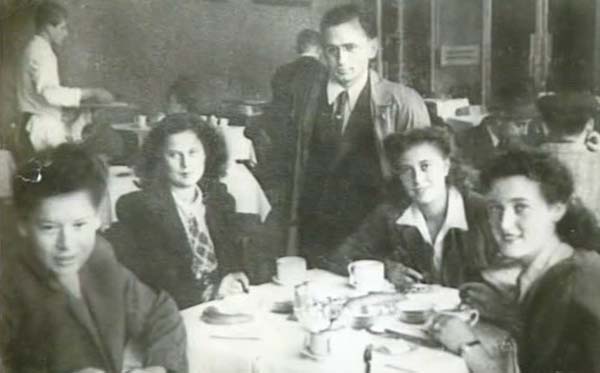Ibolya Ginsburg, Pásztó, Hungary, 1944:
"I will tell you exactly: the Germans came in the day after Pesach & we arrived in Auschwitz the first day of #Shavuot, so that was six weeks. In six weeks they came in, they put us in the ghetto & they took us out…"
1/12
"I will tell you exactly: the Germans came in the day after Pesach & we arrived in Auschwitz the first day of #Shavuot, so that was six weeks. In six weeks they came in, they put us in the ghetto & they took us out…"
1/12

"We went out on horse & cart. The station was emptied of all inhabitants. These long cattle wagons were standing next to the platform. They were open & there was nothing in them, on the floor, the corner was partitioned off with blankets & there were buckets for our needs…"
"In another corner they had some buckets with clean water to drink. We had to climb in these wagons, they said around 70 per wagon. You just go up, & carry your luggage. We put it down & we sat around on the floor. I sat opposite the door, we sort of sat in a half circle…"
3/12
3/12
"I had my sister & my aunts there, & father & mother opposite & between them the 2 children, the young ones. I was 19. Judith, my sister was 13, there was Rachel, 10, & Miriam, 7, when they took us. Before they closed the wagons they said, 'Pick 10 men to be in charge'…"
4/12
4/12
"I still had a watch on my hand, from my boyfriend. An old Hungarian soldier said 'You know you can't have that. You must take it off.' He probably just pocketed it. When I took that off I had this premonition that I shall never see my boyfriend again. 72 of us in the wagon…"
"It took ages until he shut this wagon with this bang, & locked us in. This deathly silence, the children, the babies, all the ill people. Eventually we start moving, this clatter & this movement. Then it gathered speed, the train went so fast, so noisy for the whole 3 days…"
"I couldn’t have a decent conversation with my mother or father, we just sat there. Every so often she would dole us out some food. There were little cracks, we would look out & say, 'We just passed a station.' We didn’t know where we were going, so some of the men…"
7/12
7/12
"…stood on top of one another’s shoulders, to reach those little things in the wagon, you know, where the air came in. They stood there, finally a station came, they read it, & another one & another one. We pretty soon found out that they are not taking us to Germany at all…"
"We were going across Slovakia. On the second night we stopped late at night, about a mile out from a station. They opened the wagons & took water for the train & took out the dirty buckets & we got fresh water. On the third night the same thing happened…"
"All these 3 days we couldn’t sleep properly lying down, we were hunched up together, but we slept & the noise & the rattle was terrible. Luckily nobody died in the wagon. Occasionally you heard a baby cry, the children were so good & quiet. People were full of foreboding…"
"'Where are they taking us? What are they going to do with us?' It showed on the children, this terrible fright & panic. The third morning I woke up in the dark. What woke me up? The train stopped & it was quiet. I lay there & I realised that we must have arrived somewhere."
Very sadly, only Ibolya, her sister Judith & father survived. The rest of the family were murdered soon after their arrival in Auschwitz.
The photos show Ibolya with her mother Emily Davidovitch, Pásztó, 1927 + Ibolya in 2004.
Read more about Ibolya: ajrrefugeevoices.org.uk/RefugeeVoices/…
The photos show Ibolya with her mother Emily Davidovitch, Pásztó, 1927 + Ibolya in 2004.
Read more about Ibolya: ajrrefugeevoices.org.uk/RefugeeVoices/…

• • •
Missing some Tweet in this thread? You can try to
force a refresh

 Read on Twitter
Read on Twitter










